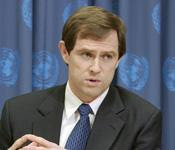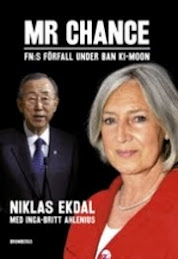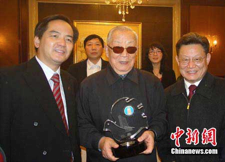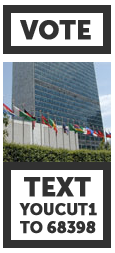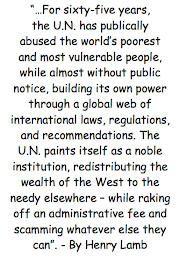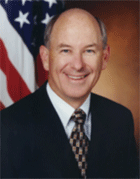If you don't like your tax bill now, watch out for the plans of the United Nations. The U.N. has been cooking up proposals to tax you every time you fly, drink, bank, use the Internet or earn a buck.
For an institution that has yet to master the art of policing its own accounts, that's awfully ambitious. But an urge to dig ever deeper into your wallet, dear tax-payer, has become a staple on the drawing boards of U.N. plan-o-crats.
The U.N. already collects billions in both dues and voluntary contributions from the governments of the developed world--first and foremost from the U.S., which typically foots the bill for roughly one-quarter of most major U.N. activities. The actual U.N. budget is a slippery number. The book-keeping is opaque, often tardy or incomplete and spread across many parts of the U.N. archipelago, with no single U.N. office fully accountable for the entire system. In 2006 then-Secretary General Kofi Annan said the U.N. system-wide budget was about $20 billion; by now, with ever-expanding U.N. operations, funding appeals and hazily defined "partnerships," it is certainly larger. But for U.N. spenders this torrent of other people's money is not enough.
Since its founding in 1945, as essentially a diplomatic talking shop headquartered in the U.S., the U.N. has ballooned into a sort of post-colonial global empire, involving scores of thousands of staff, peacekeepers, agencies and proliferating agendas worldwide. With that has come a voracious hunger for money, in which U.N. planners keep casting an acquisitive eye at global commerce, looking for ways to tap in and open the spigots straight into the U.N.'s coffers.
Some years back, the U.N. welcomed the new millennium with a proposal that wealthy nations start turning over 0.7% of their gross national product for aid to the developing world. At the same time the U.N. ramped up its "climate change" campaign for de facto taxes and controls on carbon emissions (based on the U.N.'s politicized "science"), with visions of the command-and-control transfer of billions--or ultimately trillions--around the globe. In such schemes, the U.N. envisions itself manning the main switch.
The U.N. has also been debating a raft of ideas for more targeted global taxes. Just this month comes a dispatch by George Russell, executive editor of Fox News, that the World Health Organization has been honing a "suite of proposals" for asking member states to levy tolls that would be paid directly to the U.N. The WHO notions range from taxes on Internet use, to financial transactions to alcohol, tobacco and weapons.
These campaigns have yet to pan out into the full bonanzas the U.N. hopes for. But for the U.N., there is little cost to trying again and again, gaining traction here and there. All it usually takes is the ability of ambitious U.N. bureaucrats to put together a conference. The planning group for the conference becomes a secretariat. That secretariat becomes the seed of the next U.N. mandate, department or initiative, with the next suite of tax proposals on the table.
So who is keeping an eye on these increasingly acquisitive ambitions of the U.N.? And who is minding the books for its ever-expanding budgets?
The sorry answer is that while U.N. ambitions and spending have soared, U.N. reform efforts have largely fizzled. Oversight has been receding to dismal levels. In a Jan. 12 story headlined "U.N. cuts back on investigating fraud," John Heilprin of the Associated Press outlined just how bad the situation now is. In the wake of Oil-for-Food plus a slew of other scandals, a special task force was set up at the UN in 2006 to probe corruption. That task force uncovered, Heilprin reports, at least 20 major schemes "affecting more than $1 billion in U.N. contracts and international aid." The U.N. response was to dissolve the task force at the beginning of 2009. Since then, reports Heilprin, "Not a single significant fraud or corruption case has been completed, compared with an average of 150 cases a year investigated by the task force." Several reports from late 2008 "still await a final decision from Secretary-General Ban Ki-moon more than a year later."
The U.N. has an office of internal oversight, set up at U.S. behest as part of a push for U.N. reform in the mid-1990s. But this office has itself been bedeviled by favoritism, erratic coverage of U.N. activities, under-staffing, under-funding and cover-ups. The U.N. also has a so-called external Board of Auditors, which devotes itself chiefly to inside baseball--cranking out lengthy but largely toothless reports. This board is run by rotating trios of U.N. member states; the current trio consists of France, South Africa and China.
Among the U.N.'s 192 member states, the only member with any record of serious effort to clean up the U.N. is the U.S. (with the U.K. running a distant second). Right now, despite President Barack Obama's professed interest in the U.N., the U.S. is largely missing in action on U.N. oversight. In recent years, for instance, the U.S. Mission to the U.N. began doing its bit for U.N. transparency by posting U.N. internal audits on the U.S. Mission Web site. That ended, quietly, with the beginning of the Obama administration and the arrival of Ambassador Susan Rice. Since late 2008, no more U.N. audits have been posted (I hope that mentioning this does not result in the U.S. Mission scrubbing even the old audits still there).
The U.S. Congress has also largely lost interest in how the U.N. handles the money of U.S. taxpayers. A few legislators still try to keep watch, such as Sen. Tom Coburn and Rep. Ileana Ros-Lehtinen. But the congressional staffers who developed expertise in delving into the U.N. money maze are mostly gone from government. Sen. Norm Coleman, who did sterling work digging into billions in corruption under Oil-for-Food, is now gone from the Senate. That seat is now filled by Sen. Al Franken, who has displayed more interest in riding herd on Sen. Joe Lieberman than on the U.N.
There are few subjects more tedious than audits and oversight of the alphabet soup empire of the U.N. But the current mix of an ever-greedier U.N. with less and less oversight has the makings of scandals ahead that will dwarf Oil-for-Food. With President Barack Obama lauding the U.N. as a forum for global peace and progress, what's Washington going to do about this mess?
Claudia Rosett, a journalist in residence with the Foundation for Defense of Democracies, writes a weekly column on foreign affairs for Forbes.







